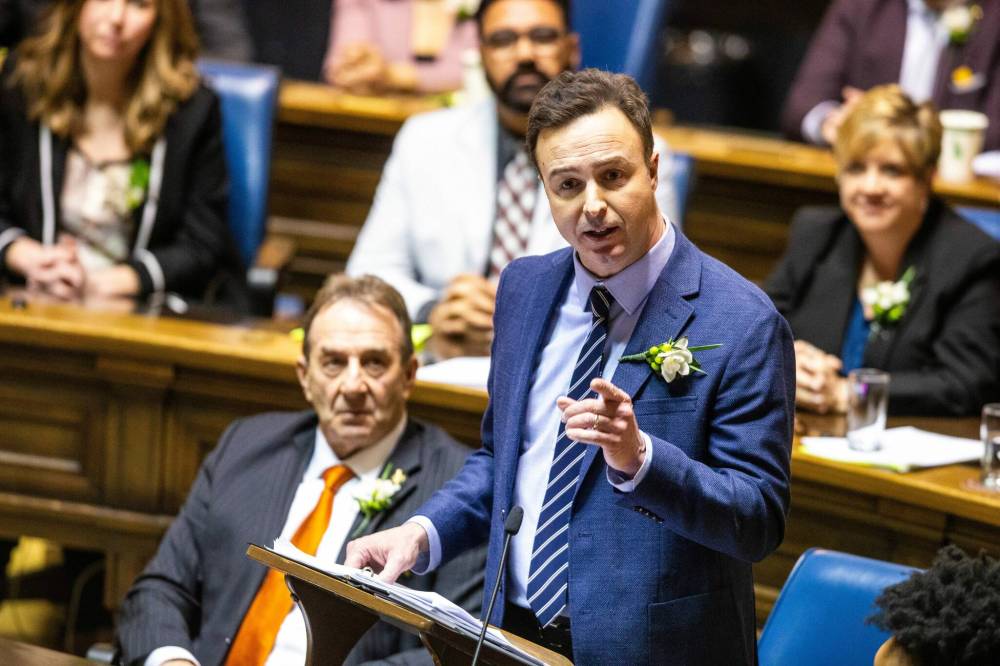NDP’s omnibus budget implementation bill includes promised legislation delayed by Tories
Advertisement
Read this article for free:
or
Already have an account? Log in here »
To continue reading, please subscribe:
Monthly Digital Subscription
$19 $0 for the first 4 weeks*
- Enjoy unlimited reading on winnipegfreepress.com
- Read the E-Edition, our digital replica newspaper
- Access News Break, our award-winning app
- Play interactive puzzles
*No charge for 4 weeks then billed as $19 every four weeks (new subscribers and qualified returning subscribers only). Cancel anytime.
Read unlimited articles for free today:
or
Already have an account? Log in here »
The NDP government introduced a 90-page budget implementation bill Monday packed with promised pieces of legislation, as well as an increase in subsidies for election candidates and parties.
The omnibus Bill 37 — the Budget Implementation and Tax Statutes Amendment Act, 2024 includes measures required to implement tax changes in the April 2 budget — as well as a host of other acts and amendments on the NDP agenda.
Amendments to the provision for the fuel tax holiday — the suspension of the 14-cent-per-litre provincial gas that took effect Jan. 1 and expires at the end of September— will allow the government to change the fuel tax by regulation, rather than legislation.

“We want to ensure there’s some flexibility there,” Finance Minister Adrien Sala told reporters, declining to say whether the tax will return to 14 cents per litre on Oct. 1.
The BITSA bill includes the Labour Relations Amendment Act to ban replacement workers during a lockout or strike and make it easier to form a union by requiring a simple majority of workers to join a union. Labour Minister Malaya Marcelino and Premier Wab Kinew held a press conference March 18 to announce the bill with dozens of unionized workers at the legislature expecting to see it introduced. The bill was blocked by the Opposition Progressive Conservatives, who repeatedly stood on procedural matters to delay government business.
The Seniors Advocate Act that was also initially held up by the PCs was also in Monday’s budget bill. It would establish an officer of the assembly “to identify, review and analyze systemic problems or concerns important to the lives of seniors” and collaborate with service providers and organizations to address them.
The Environment Amendment Act was announced by the NDP two months ago but wasn’t introduced until Monday as part of the BITSA bill. The act expands the actions that require a licence and enables the administration of fines for failure to comply with environmental protection orders: up to $25,000 for an individual and $125,000 for a corporation.
In a March 6 news release, the government said it would amend the act in the wake of a huge sewage spill in Winnipeg.
“Our government is strengthening our ability to protect lakes and rivers for Manitobans,” Environment and Climate Change Minister Tracy Schmidt said in a news release at the time. “We want to be able to step in right away when there are issues with water treatment.”
The Manitoba Hydro Amendment Act would remove consideration of the Crown corporation’s debt-to-capitalization ratio when setting electricity rates, and require that a general annual rate increase can’t exceed four per cent.
“Those changes specifically do away with what the last government did, that is to bring in a bill that set rates at the cabinet table,” Sala said.
That PCs had capped hydro rate increases at the rate of inflation to a maximum of five per cent, with Public Utilities Board rate application hearings to be held every three years instead of every year, starting in 2025.
“This bill moves away from what the last government has done… and it restores the ability to set rates at the Public Utilities Board, which is where they should be set,” Sala said. “This is one measure to ensure we keep rates affordable.”
The Election Financing Amendment Act — which the government hadn’t previously mentioned as part of its legislative agenda — increases the maximum reimbursement of election expenses to 50 per cent, up from 25 per cent. It reverses the former PC government’s cut that reduced the reimbursement for eligible parties and candidates to 25 per cent from 50 per cent.
“We want to ensure that as many Manitobans as possible can participate in our democracy,” said Sala, whose party raised and spent more than the Tories in last year’s provincial election.
“They’ve had ample opportunity to introduce these bills in a way that would allow them to be considered thoughtfully by both the public and the legislature, and they failed to do that. Now they’re ramming it in through BITSA.”– PC deputy leader Kathleen Cook
“We think this helps to open things up,” he said. “Anyone who wants to participate in our democracy has the ability to do so.”
PC deputy leader Kathleen Cook (Roblin) called out the New Democrats for poor time management, saying the result is many bills being stuffed into omnibus legislation and not getting the scrutiny they deserve.
“I find that concerning. I think it speaks to the NDP’s mismanagement of their own house schedule,” said Cook, who declined to comment on the specifics of the bill until she had a chance to study it.
“They’ve had ample opportunity to introduce these bills in a way that would allow them to be considered thoughtfully by both the public and the legislature, and they failed to do that,” Cook told reporters Monday. “Now they’re ramming it in through BITSA.”
The finance minister made no apologies for the omnibus bill.
“We have a bold legislative and budgetary agenda,” Sala said.
“This bill helps us to implement our budget and the commitments we made to Manitobans to make life more affordable, to protect our environment, to ensure that Manitobans aren’t paying unnecessarily high hydro rates, and to make it easier for them to join a union,” said Sala.
“Every item in this BITSA bill helps us to enact elements of our budget.”
carol.sanders@freepress.mb.ca

Carol Sanders
Legislature reporter
After 20 years of reporting on the growing diversity of people calling Manitoba home, Carol moved to the legislature bureau in early 2020.
Our newsroom depends on a growing audience of readers to power our journalism. If you are not a paid reader, please consider becoming a subscriber.
Our newsroom depends on its audience of readers to power our journalism. Thank you for your support.







